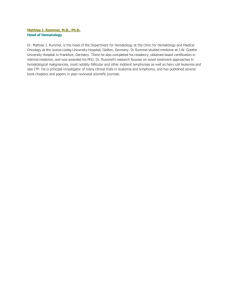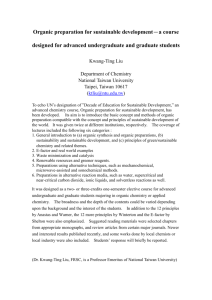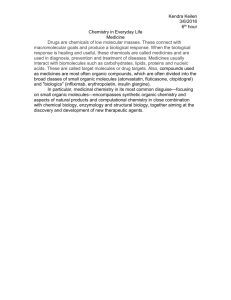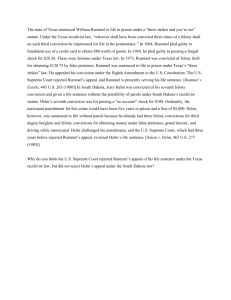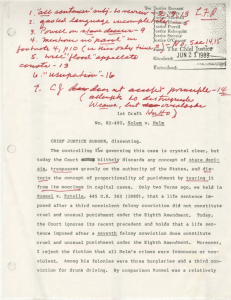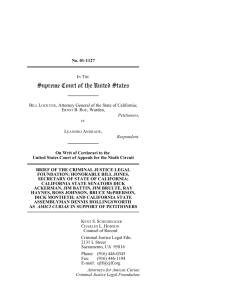Chem 213B Fall 2011
advertisement
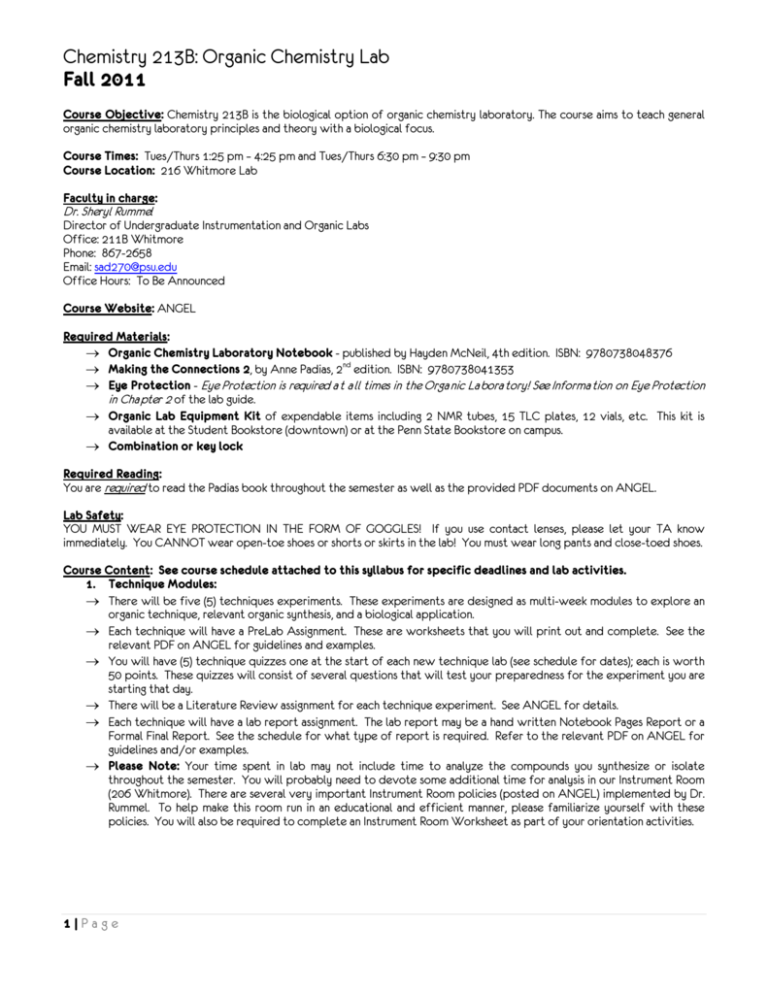
Chemistry 213B: Organic Chemistry Lab Fall 2011 Course Objective: Chemistry 213B is the biological option of organic chemistry laboratory. The course aims to teach general organic chemistry laboratory principles and theory with a biological focus. Course Times: Tues/Thurs 1:25 pm – 4:25 pm and Tues/Thurs 6:30 pm – 9:30 pm Course Location: 216 Whitmore Lab Faculty in charge: Dr. Sheryl Rummel Director of Undergraduate Instrumentation and Organic Labs Office: 211B Whitmore Phone: 867-2658 Email: sad270@psu.edu Office Hours: To Be Announced Course Website: ANGEL Required Materials: → Organic Chemistry Laboratory Notebook - published by Hayden McNeil, 4th edition. ISBN: 9780738048376 → Making the Connections 2, by Anne Padias, 2nd edition. ISBN: 9780738041353 → Eye Protection - Eye Protection is required at all times in the Organic Laboratory! See Information on Eye Protection in Chapter 2 of the lab guide. → Organic Lab Equipment Kit of expendable items including 2 NMR tubes, 15 TLC plates, 12 vials, etc. This kit is available at the Student Bookstore (downtown) or at the Penn State Bookstore on campus. → Combination or key lock Required Reading: You are required to read the Padias book throughout the semester as well as the provided PDF documents on ANGEL. Lab Safety: YOU MUST WEAR EYE PROTECTION IN THE FORM OF GOGGLES! If you use contact lenses, please let your TA know immediately. You CANNOT wear open-toe shoes or shorts or skirts in the lab! You must wear long pants and close-toed shoes. Course Content: See course schedule attached to this syllabus for specific deadlines and lab activities. 1. Technique Modules: → There will be five (5) techniques experiments. These experiments are designed as multi-week modules to explore an organic technique, relevant organic synthesis, and a biological application. → Each technique will have a PreLab Assignment. These are worksheets that you will print out and complete. See the relevant PDF on ANGEL for guidelines and examples. → You will have (5) technique quizzes one at the start of each new technique lab (see schedule for dates); each is worth 50 points. These quizzes will consist of several questions that will test your preparedness for the experiment you are starting that day. → There will be a Literature Review assignment for each technique experiment. See ANGEL for details. → Each technique will have a lab report assignment. The lab report may be a hand written Notebook Pages Report or a Formal Final Report. See the schedule for what type of report is required. Refer to the relevant PDF on ANGEL for guidelines and/or examples. → Please Note: Your time spent in lab may not include time to analyze the compounds you synthesize or isolate throughout the semester. You will probably need to devote some additional time for analysis in our Instrument Room (206 Whitmore). There are several very important Instrument Room policies (posted on ANGEL) implemented by Dr. Rummel. To help make this room run in an educational and efficient manner, please familiarize yourself with these policies. You will also be required to complete an Instrument Room Worksheet as part of your orientation activities. 1|Page Chemistry 213B: Organic Chemistry Lab Fall 2011 2. Mini-Project: In lieu of synthetic experiments, students will work on a mini-project the last three to four weeks of the semster. It will most likely be a multi-step synthesis to make a biologically active compound that will then be tested in a biological assay. → You will have a quiz at the start of the mini-project (see schedule for date) worth 50 points. → There will also be a Literature Review assignment for the mini-project. See ANGEL for details. → Each student will write a Formal Final Report on the Mini-Project detailing proper background, procedures, discussion, and results. 3. Poster Presentation: You will be broken into 5 groups to make a poster on an assigned module that you did during the semester. Your group will present your poster at the Undergraduate Poster Symposium held on the evening of the last Wednesday in the semester. 4. Final Exam: The Final Exam will test you on all lab techniques that you learned during the semester and how/when they are applied; it is weighted as 10% toward your final grade. Grading: → Your final grade will be weighted. ANGEL is there for you to keep track of the points you earn. When calculating your final grade, KEEP THIS IN CONSIDERATION! The weighting of the assignments is as follows: Reports- 50%, Prelab Assignments- 10%, Literature Reviews- 5%, Quizzes- 10%, Poster Presentation- 10%, Orientation/Checkout Activities- 5%, and Final Exam- 10%. → The average final grade per section is typically in the B+ range. If the average for your section falls in the B+ range, traditional grade lines will then be used to assign final grades (for example, 93-100 is an A; 90-92 is an A-; 87-89 is a B+; 83-86 is a B; 80-82 is a B-, etc). To account for differences in grading between TAs and sections, YOUR GRADE MAY BE NORMALIZED (curved UP or DOWN). → Your TA should provide the class with averages for each report and quiz; use this average as a reference point to gauge your progress. Your TA should also hand back your reports no later than one week after the due date. If this is not being done, please see the course instructor. → Calculating your final grade: use the weighted “Chem 213B Grade Calculator” spreadsheet on ANGEL. Breakdown of Points: Points Orientation Exercises 100 Check Out Activities 100 REPORTS: (800 total) Recrystallization NP Report 100 Extraction FFR* 200 Distillation FFR 200 TLC NP Report 100 CC FFR 200 Prelab Assignments (6 total) 50 x 6 Quizzes (6 total) 50 x 6 Literature Reviews (6 total) 50 x 6 Poster Presentation 300 Final Exam 100 *Extraction formal final report will be submitted in two drafts. One-half of the points lost in the first draft can be earned back in the second draft. Absences: If you are not able to attend lab for an excusable reason (e.g. sickness, family emergency), you are to notify your TA and Dr. Rummel immediately by email. You have a 24-hour period of time to notify us regarding your absence. You will not be granted extensions on work due on that day or on future assignments linked to work to be completed that day if you do not contact us during the 24-hour period starting when lab meets. If you need to make up lab work, please talk to Dr. Rummel ASAP. 2|Page Chemistry 213B: Organic Chemistry Lab Fall 2011 Late Policy: For the first day an assignment is late, you will lose 10% of the total possible points and each additional day you will lose 5% of the total possible points. The late days include weekends and holidays. This late policy applies to all Prelabs, Notebook Pages, and Formal Final Reports. Academic Dishonesty: Academic dishonesty includes, but is not limited to, the following situations: → Giving the electronic file of your final report to another current student or future student via e-mail, flash drive, CD, etc. → Using someone else’s data, not citing other student’s data or fabricating data. → Using phrases or sentences directly or paraphrasing from the lab guide or any other source (book, journal, or website) and not referencing that source or not using quotes. → Using phrases or sentences directly from the lab guide or any other source (book, journal, or website), referencing that source, but not using quotes. → Using more than one sentence directly from or paraphrasing from the lab guide or any other source (book, journal, or website) even if you reference it and use quotes. You are required to have all your written work in your own words! If you are found to be involved with academic dishonesty on any report or quiz, you will be given a zero. The second offense will involve receiving an F or an XF for the course. Please see Chapter 1, Section 1.6 for a detailed discussion on academic dishonesty. All University and Eberly College of Science policies regarding academic integrity/academic dishonesty apply to this course and to the students enrolled in this course. Refer to the following URL for further details on the academic integrity policies of the Eberly College of Science: http://www.science.psu.edu/academic/Integrity/index.html, http://www.sa.psu.edu/ja/conduct.shtml The Code of Mutual Respect and Cooperation: The Eberly College of Science Code of Mutual Respect and Cooperation pertains to all members of the College community; faculty, staff, and students. http://www.science.psu.edu/climate/code-of-mutual-respect-and-cooperation-1 The Code of Mutual Respect and Cooperation was developed to embody the values that we hope our faculty, staff, and students possess, consistent with the aspirational goals expressed in the Penn State Principles. The University is strongly committed to freedom of expression, and consequently, the Code does not constitute University or College policy, and is not intended to interfere in any way with an individual’s academic or personal freedoms. We hope, however, that individuals will voluntarily endorse the 12 principles set forth in the Code, thereby helping us make the Eberly College of Science a place where every individual feels respected and valued, as well as challenged and rewarded. The 12 Principles of the Code are: 1. Treat everyone equally and with respect 2. Be courteous 3. Be ready to communicate 4. Encourage others and share your expertise with them 5. Give and accept constructive criticism 6. Be receptive to change 7. Be a team player 8. Get involved 9. Have a positive attitude 10. Be honest and accept responsibility 11. Recognize other people’s priorities 12. Strive to do your best 3|Page Chemistry 213B: Organic Chemistry Lab Fall 2011 Letters of Recommendation: Your TA and Dr. Rummel compose letters of recommendation. It is recommended that you only seek a letter of recommendation if your current course grade is A- or better. Your TA will supply Dr. Rummel with a personal statement that reflects your performance and interactions with your colleagues in the lab. When requesting a letter or recommendation please follow this procedure: 1. 2. 3. 4. Inform your TA of your intent to request a letter of recommendation and ask him/her to please draft a personal statement for you. Notify your TA when due dates. See Dr. Rummel and log your name in the “Request for Recommendation Book” and obtain a “Request for Recommendation Form.” Give Dr. Rummel the following information: → Personal statement of your career goals and the reason for the recommendation. → Request for Recommendation form (Include your lab section and TA’s name in your request). → The due date for the letter and information regarding the recipient: address, any special information the intended recipient may need and or information that would be helpful to when drafting the letter. When the letter is complete you will receive an email from Dr. Rummel letting you know the letter has been sent to the recipient. Email Correspondence with Dr. Rummel: I try to check my email several times a day. I do not answer email from home in the evenings. I also do not answer email on the weekends. If you send email after 5 pm on a weekday, I will try to answer it the following morning. Please make sure you include the name of your TA, your lab section, and the name of the experiment or specific procedure in all correspondence. Numerous emails are received without such information and it delays the response time. Clean up and Check out: You are required to assist in lab clean up and check out at the end of the semester. If you cannot attend the last day of lab then you must make other arrangements with Dr. Rummel at least one week in advance. Remember your lab final will also take place on the last day of lab. If a student fails to check out of their lab locker they will lose the 100 points associated with check-out. Important Links: Journal of Chemical Education: http://pubs.acs.org/journal/jceda8 SciFinder Scholar: www.scifinder.cas.org 4|Page
